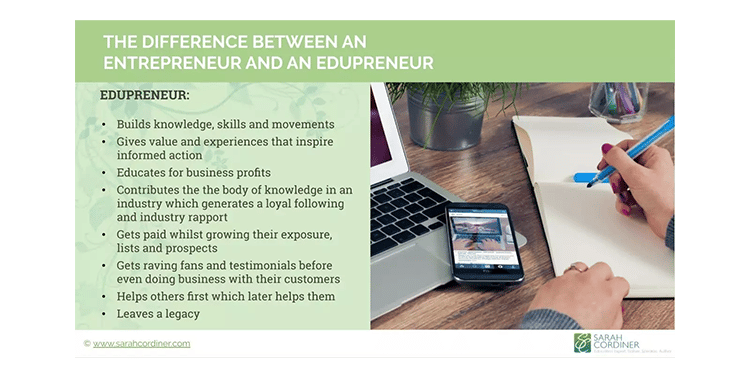The online learning industry is experiencing unprecedented growth. By 2025, the global eLearning industry is expected to be worth a staggering $325 billion.
This presents a perfect opportunity for edupreneurs to create a healthy income by sharing their knowledge online.
An edupreneur is an education entrepreneur. It’s someone who works within the education sector, and whose goal is to create a positive value shift using “learning” as an economic resource.
If that’s you, you can redefine your future by participating.
Read the rest of this article to learn what is an edupreneur, the evolution of edupreneurship, and examples of successful edupreneurs. I’ll also share a handy 5-step process for becoming an edupreneur.
Without further ado, let’s dive right in by first explaining what is an edupreneur.
What Is An Edupreneur?
An edupreneur is an entrepreneur who works in the education sector. They sell their skills, expertise, and knowledge to an audience using learning platforms like Thinkific, Learnworlds, Teachable, or another online course platform.
They do many of the things traditional teachers do, including building a website, but they take hands-on responsibility in designing, creating, and developing programs, products, or services in the education sector.
While traditional teachers don’t care about profits, edupreneurs do.
And while traditional teachers focus only on teaching, their counterparts focus on setting up business systems.
But even beyond that, edupreneurs are educators who push the boundaries and take risks that others are not willing to take.
Most of their focus is on marketing their skills and expertise to individual learners, schools, colleges, universities, for-profit, and non-profit organizations.
Types of edupreneurs include:
- Coaches (Life, business, health, personal development, etc.)
- Online course creators
- YouTubers
- Bloggers
- Podcasters
- Strategists
- Affiliate marketers
…and many others.
Important Note: An edupreneur doesn’t necessarily have to be good at teaching. Unlike traditional teachers, who have a limited scope – teaching students – an edupreneur sets up an education system that is more focused on increasing their reach, as well as operating even when they’re not actively working.
Those are the main differences between the Educators and Edupreneurs.
But what makes Edupreneurs different from Entrepreneurs?
The images below outline the differences:


The Evolution of Edupreneurship
The idea of educators with entrepreneurial mindsets isn’t a new one, but it has certainly gained a lot of popularity over the past few years.
The rise of this new wave of entrepreneurs is in answer to the insatiable thirst for learning and self-development
And once it became apparent that practical innovation and entrepreneurship were crucial for education, a new term was coined “Edupreneur”, combining two important words:
Educator + Entrepreneur
Of course, these days, there’s another term being used – “Teacherpreneur”, but it all means the same thing. Both words refer to anyone who is bridging education and the world of business.
Benefits of Edupreneurship
Aside from being extremely rewarding, this career choice also comes with a wealth of other benefits, such as the following:
- No More Selling: You never again have to sell (convince/persuade/promote) anything to your potential customers. By this, I mean that you can show people your skills and knowledge to demonstrate your capability to prospective buyers in an educational way, through blog posts, selling online courses, live streams, webinars, eBooks, audiobooks, etc., and this will bring you far better results than traditional marketing campaigns ever could.
- Solidify Your Authority and Credibility: Demonstrating your expertise through the use of educational content will help you prove your “street cred” in the industry. In fact, developing your own training programs is one of the surest ways to the top of whatever niche you’re in. It adds to your professional credentials and allows you to position yourself as an expert in your field.
- Gain a Global Client Base: As an edupreneur, you’ll be able to build a scalable business model with a global customer base. You get increased exposure, and with that comes increased income. The best part is that a large part of this income can be passive income that continues to grow with minimal effort (after the initial setup, of course).
Examples of Successful Edupreneurs
Here are a few examples of educators who consider education to be a valuable economic resource that can have a huge impact on the success (whether perceived or actual) of individuals today.
Each of them approaches the improvement of education as a business and embraces challenges and change as opportunities for advancing their business goals.
As a result, they have experienced phenomenal success in their businesses.
Example #1: Elna Cain

Elna Cain is a freelance writer who uses her expertise to teach others how to start a freelance writing business.
She’s an edupreneur who uses the knowledge she’s gathered herself over the years writing for clients to help others build freelance writing businesses of their own.
Example #2: Angela Maiers

Angela Maiers is the founder of Choose2Matter and has been leading change in the education sector for over three decades.
Today, her business reaches over a million students in 50 countries, including the US, UK, Canada, Australia, and South Africa.
She’s also authored many books and instructional guides, including her latest work: Genius Matters.
She is driven by a need to create, build, grow, and impact her audience to use their strengths and genius to make a difference in their space.
Example #3: Jacques Hopkins

Jacques is an edupreneur who gets to share his innate gift. He gets to do something he’s naturally good at and earn a living from it!
He lives out his passion and makes a six-figure income from his talent.
He teaches piano to aspiring pianists and has created a phenomenal 21-day course that lets regular people learn how to play their favorite songs in just three weeks.
5 Traits of Successful Edupreneurs
Research has shown that successful edupreneurs possess many of the same characteristics. This means that if you want to leverage your skills in the field of education, there are certain traits that you’ll need to cultivate, including the following:
1. Learning
As an educator, you must always be learning. Your success will depend greatly on your ability to be a continuous learner. Keep up with the latest goings-on in your industry and look out for trends, technology integration, research, leadership, and any other topic that interests or inspires you.
2. Creativity
As an edupreneur, you need to be creative. Surround yourself with inspiring people who will elicit new ideas in you. Do your best to get feedback every day by talking to people around you, on social media, and on various other platforms. Ask questions to test the waters of the topics you are advancing. All of this will aid in increasing your creativity.
3. Resilience
Edupreneurs don’t give up when the going gets tough. As previously noted, they look at changes and challenges as opportunities to improve and expand their businesses, rather than roadblocks to their success.
4. Risk-Taking
As an education entrepreneur, you will have to devote a lot of your time, money, energy, or resources toward the outcome you want for your knowledge business. From providing services to developing lesson plans and defining student learning goals, there’s a lot that goes into your business if you want to make your services widely available – including project infrastructure, management systems, course delivery platforms, and various other technologies.
5. Problem-Solving
The education industry faces constant change, and you’ll have to learn how to embrace change as an inevitable part of your business. You’ll need to have an overall strategy or plan to help you achieve your specific business outcomes while being able to plan for any necessary changes that occur as your business expands. This requires you to have strong problem-solving skills that allow you to adapt on the fly.
How to Become an Edupreneuer
I hope the skills mentioned above have helped you understand what it takes to embark on this journey.
It’s clear to see that edupreneurs are business leaders in education, and if you’ve decided that this is the career path you want to follow, here is the 5-step process to help you start your edupreneur journey.
Step #1: Choose Your Niche
In order to become a successful edupreneur, you first need to develop niche clarity. Keep in mind that as a creator, you can’t be all things to everyone. You must become clear on exactly what you plan to teach and who your target learners will be.
For example, if you are a yoga teacher, trying to teach all aspects of yoga won’t help you build an engaged audience. But, if you focus on one aspect, say, “Yoga for expecting mothers”, then you’re likely to be able to quickly build an engaged audience around your content.
Make sure that whenever prospective learners come to your website, they immediately understand what your niche is so they know they are learning from an expert, not a Jack of all trades.
Step #2: Plan
Once you know what your business should be, then the next step is to start planning. There’s a lot to do in this stage, including business planning, legal structures, breakdowns for determining your target audience, etc.
Here are the four main things you should focus on at this beginning stage:
- Determine your target audience
- Implement systems and processes for running your knowledge business
- Create a comprehensive digital marketing strategy
- Incorporate, purchase domain names, and make sure your taxes and accounting are in order
Once you have these important pieces in place, you can move on to the next step in your journey to becoming an edupreneur.
Step #3: Create Content and Sell Your Expertise
Now, it’s time to start creating content so you can showcase your expertise.
Remember, people tend to conduct a lot of research before making a purchase. Whether they are buying an eBook, report, video content, or online course, most people read blog posts, watch videos, or look for social proof about the digital product before making a purchase.
You can create a wide range of content to help searchers get to know you and speed up the buying process by building trust and communicating value with content.
There are many different types of content you can create, including:
- Blog posts
- Social media posts (Instagram/Twitter/TikTok, etc.)
- Weekly newsletters
- YouTube videos
- Podcasts
- Webinars
- eBooks/Audiobooks
- Whitepapers/Checklists/Reports
- Case studies
- Free online/Email courses
- Coaching calls
- Private communities (OnlyFans can be great for this, it’s not just adult content)
- Groups/Forums
…and so on.
Go with whatever works best for your particular audience.
Step #4: Automate Your Process
Once you get your content creation process started, it’s time to build a marketing funnel and automated sales system.
As an edupreneur, you’ll find that creating content is one thing, but being able to sell it is an entirely different ballgame.
That’s why you have to learn the skill of marketing. You have to use tools and resources to create an automated system that allows you to expand your reach, scale your business, and continue to generate income even when you’re not actively working.
Some of the tools you might use include:
- Email marketing software
- Course creation software
- Ad networks
- Affiliate networks
- Blogging platforms
- Social media scheduling tools
…and various other technologies.
Step #5: Get a Mentor
The relationship between mentors and mentees has been around for thousands of years as a way to transfer knowledge and skills.
One of the reasons why this type of relationship still thrives today is that it gets results.
To help you on your journey to becoming a successful edupreneur, find a mentor who’s already been where you want to go.
This way, you’ll be able to master your craft without having to put in the years (and possibly decades) it might take otherwise.
Simply conduct an online search for mentors in your specific niche and reach out to whoever best embodies the values you hold.
That person is most likely to help you stay motivated to achieve the challenging goals of becoming a successful edupreneur.
I hope my guide on what is an edupreneur has helped you understand the intricacies of edupreneurship and how to become one. Good luck!
